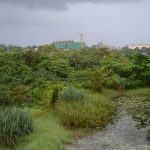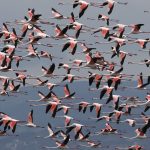What to do with millions of cubic yards of muck dredged from assorted waterways around New York Harbor? Why, bring the muck to Jamaica Bay where it will be used to try to restore some of the thousands of acres of salt marsh lost over the decades. The New York Times has the story.
Recent Posts
 Birds of the Mornington PeninsulaBy Sanjana Raj
Birds of the Mornington PeninsulaBy Sanjana Raj Three Photos: Chickens of the JungleBy Kai Pflug
Three Photos: Chickens of the JungleBy Kai Pflug The Chemistry of Birds (26): Chemical Defense in Avian PreyBy Kai Pflug
The Chemistry of Birds (26): Chemical Defense in Avian PreyBy Kai Pflug Panamá – Profile for BirdersBy Fitzroy Rampersad
Panamá – Profile for BirdersBy Fitzroy Rampersad Urban Birding in Colombo – Diyasaru Wetland ParkBy Luca
Urban Birding in Colombo – Diyasaru Wetland ParkBy Luca Why Birders Dig DarwinBy Mike
Why Birders Dig DarwinBy Mike 2025: Hitting the TargetsBy David T
2025: Hitting the TargetsBy David T
Posting Calendar
| DAY | WRITER(S) | SERIES (weekly) |
|---|---|---|
| MON | Kai (w) | Birding Lodges |
| TUE | Donna (m) Susan (m) Hannah (m) Fitzroy (m) Grace (m) | Bird Guides |
| WED | Leslie (bw) Faraaz (bw) | Ask a Birder |
| THU | Paul (w) Cathy (bw) | Birder’s Lists |
| FRI | David (w) | Species Spotlight |
| SAT | Peter (bw) Luca (bw) | From the Archives |
| SUN | Clive (w) Sanjana (m) | Three Photos |
| w weekly, bw biweekly, m monthly | ||
| Any time: Jason, Mark, John, Sara, Rolf, Dragan | ||
See here for info on the writers.
Newsletter
Signup and receive notice of new posts!
Thank you!
You have successfully joined our subscriber list.






This is a great idea. When an island was constructed from dredge spoils in the Chesapeake, it attracted lots of shorebirds. I’m sure reconstructed wetlands in Jamaica Bay would do the same.
It is a great idea but I would imagine that muck from around NY harbor is rich in heavy metals, phosphate etc.
Even if it doesn’t affect the breeding success or general ecological fitness of the ecosystem (I keep reminding myself that birds aren’t EVERYTHING, but then again I think that I lie each time I think that), it is not comparable to the natural soil on which the salt marshes once grew. You can get some very good habitat back, so I generally really like thses win-win situations, but I doubt it will lead to the salt marshes lost so long ago.
Here in michigan we have a similar story with the Pointe Mouillee Area, created mostly with the dredge material extracted from the Detroit River (not a river, just the body of water between Detroit and Windsor). It is now of the best (if not THE best) place in Michigan for shorebirds in August. It helped to protect existing wetland from erosion, and created some new ones.
Off course this is fresh water here